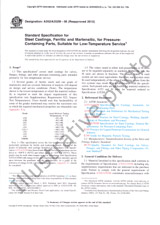We need your consent to use the individual data so that you can see information about your interests, among other things. Click "OK" to give your consent.
ASTM A616/A616M-96a
Standard Specification for Rail-Steel Deformed and Plain Bars for Concrete Reinforcement (Withdrawn 1999) (Includes all amendments And changes 2/18/2021).
Automatically translated name:
Standard Specification for Rail-Steel Deformed and Plain Bars for Concrete Reinforcement (Withdrawn 1999)
STANDARD published on 1.1.1996
The information about the standard:
Designation standards: ASTM A616/A616M-96a
Note: WITHDRAWN
Publication date standards: 1.1.1996
SKU: NS-3387
The number of pages: 4
Approximate weight : 12 g (0.03 lbs)
Country: American technical standard
Category: Technical standards ASTM
Annotation of standard text ASTM A616/A616M-96a :
Keywords:
Steel bars-concrete reinforcement, ICS Number Code 77.140.15 (Steels for reinforcement of concrete)
Additional information
| 1. Scope |
|
1.1 This specification covers deformed and plain rail-steel concrete-reinforcement bars. The standard sizes and dimensions of deformed bars and their number designations shall be those listed in Table 1. 1.1.1 A supplementary requirement (S1) of an optional nature is provided. It shall apply only when specified by the purchaser. 1.2 Bars are of two minimum yield levels: namely, 50 000 psi [350 MPa] and 60 000 psi [420 MPa], designated as Grade 50 [350] and Grade 60 [420], respectively. 1.3 Plain rounds, in sizes up to and including 2 in. [50.8 mm] in diameter, in coils or cut lengths, when specified for dowels, spirals and structural ties or supports shall be furnished under this specification in Grade 50 [350] and Grade 60 [420]. For bending properties test provisions of the nearest smaller nominal diameter deformed bar size shall apply. Those requirements providing for deformations and marking shall not be applicable. 1.4 The weldability of the steel is not part of this specification. 1.5 This specification is applicable for orders in either inch-pound units (as Specification A616) or in SI units [as Specification A616M]. 1.6 The values stated in either inch-pound units or SI units are to be regarded as standard. Within the text, the SI units are shown in brackets. The values stated in each system are not exact equivalents; therefore, each system must be used independently of the other. Combining values from the two systems may result in nonconformance with the specification. |
We recommend:
Technical standards updating
Do you want to make sure you use only the valid technical standards?
We can offer you a solution which will provide you a monthly overview concerning the updating of standards which you use.
Would you like to know more? Look at this page.




 Cookies
Cookies
